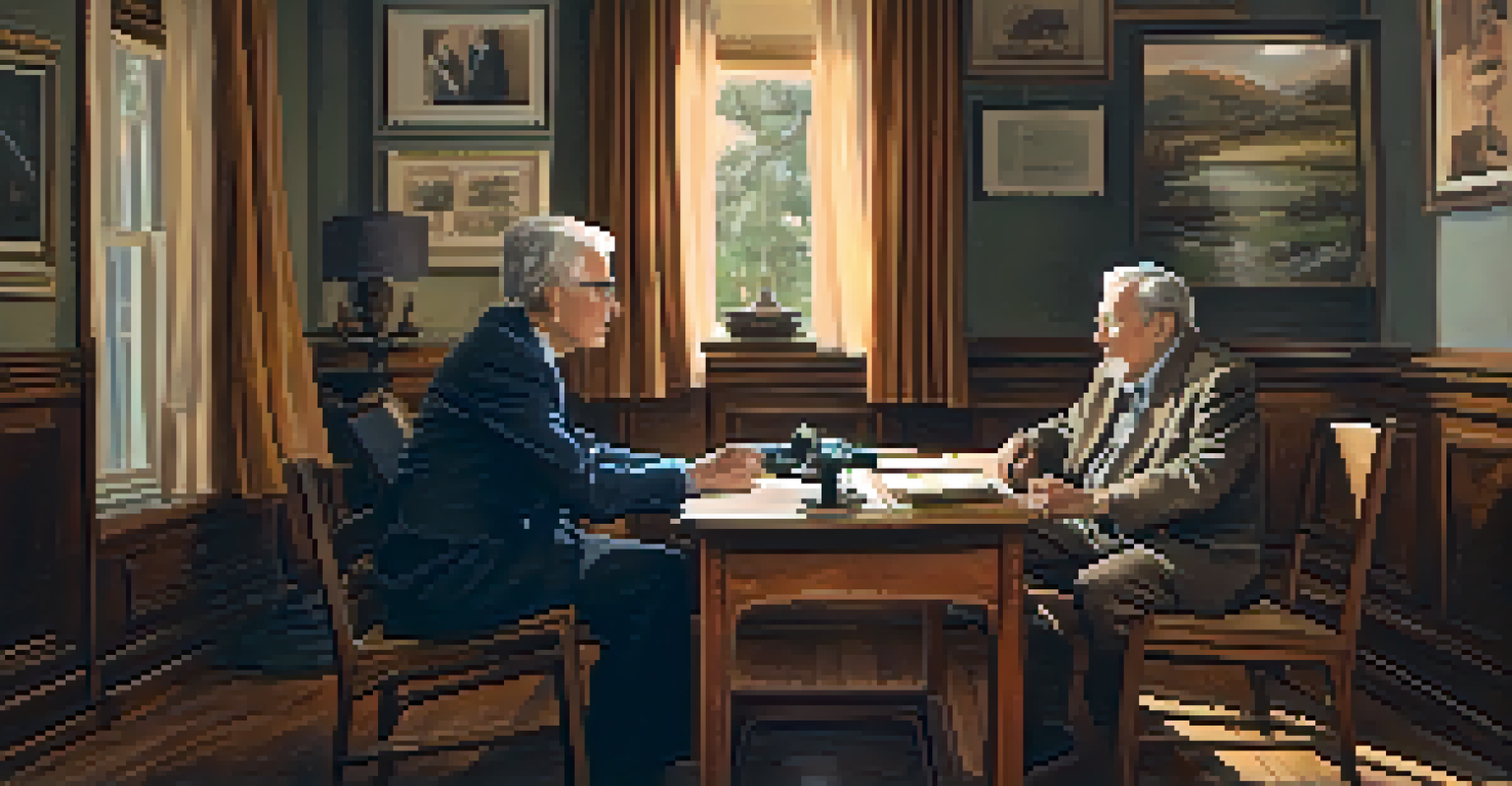Studs Terkel: Oral History and the Spirit of Chicago Literature

Who Was Studs Terkel? A Brief Overview
Studs Terkel was a renowned American author, historian, and broadcaster, best known for his oral history works. Born in Chicago in 1912, he became a prominent voice in capturing the stories of everyday Americans. His unique approach involved extensive interviews, allowing people from various walks of life to share their experiences. This method not only highlighted individual narratives but also painted a broader picture of American society.
The oral history movement has given us a way to address the missing voices of our past, allowing individuals to become the historians of their own lives.
Terkel's work gained significant recognition, especially during the turbulent times of the 1960s and 1970s. He sought to document the voices of those often overlooked in mainstream narratives, such as factory workers, musicians, and civil rights activists. His commitment to authenticity and empathy made his interviews resonate deeply with readers, showcasing the richness of human experience.
Through his books, including 'Working' and 'The Good War', Terkel brought the spirit of Chicago to life. He captured the city's essence, reflecting its struggles and triumphs. His legacy lives on, inspiring future generations to value oral history as a vital part of literature.
The Art of Oral History in Terkel's Work
Oral history is a method of gathering, preserving, and interpreting the voices of people through recorded interviews. Terkel mastered this art, using it to create compelling narratives that resonate with readers. Unlike traditional history, which often focuses on dates and events, oral history emphasizes personal stories and emotions, making it more relatable and engaging.

In his interviews, Terkel skillfully blended questions with active listening, allowing his subjects to speak freely. This technique fostered a sense of trust, leading to candid and heartfelt responses. For instance, in 'Working', he showcases a diverse range of professions, giving voice to those who often go unheard.
Studs Terkel: Oral History Pioneer
Terkel revolutionized oral history by capturing the voices of everyday Americans through empathetic interviews.
Terkel's approach highlights the importance of storytelling in understanding history. By placing the individual at the forefront, he demonstrated how personal experiences shape our collective narrative. This perspective is crucial in appreciating the complexities of human life and the societal forces at play.
Chicago: The Heart of Terkel's Narrative
Chicago was not just Terkel's home; it was a central character in his narratives. The city's rich tapestry of cultures, industries, and communities provided a fertile ground for his oral histories. From the bustling streets to the quiet neighborhoods, Terkel captured the essence of Chicago's diverse voices, reflecting its challenges and resilience.
I think of myself as a conversationalist. I want to listen to the stories of ordinary people, who have extraordinary experiences.
Terkel's love for Chicago is evident in his work, where he often highlighted the city’s labor movements, civil rights struggles, and artistic expressions. These stories not only celebrated the city's vibrancy but also acknowledged its darker chapters. By doing so, he encouraged a deeper understanding of the social dynamics at play.
Through his lens, Chicago became a microcosm of America, where individual stories intersected with larger societal issues. Terkel’s ability to weave these narratives helped solidify Chicago's place in American literature, illustrating the power of local voices in shaping national identity.
Impact of Terkel's Work on Literature
Studs Terkel's contributions to literature extend beyond his own writings; he has influenced countless authors and historians. His commitment to oral history has inspired new generations to explore narrative forms that prioritize personal experiences. This shift has led to a richer understanding of history as a tapestry woven from diverse voices.
Terkel's work has also sparked interest in documenting oral histories in various contexts, from academia to community projects. Many writers now seek to capture the essence of their own communities, following Terkel's example. This approach not only honors individual stories but also fosters a sense of belonging and connection.
Chicago as a Central Narrative
The city of Chicago served as a vibrant backdrop for Terkel's work, reflecting its diverse stories and social dynamics.
Moreover, Terkel's emphasis on empathy and understanding in storytelling has become a guiding principle for many contemporary writers. By showcasing the human experience, authors are encouraged to create works that resonate on a personal level, making literature more accessible and relatable.
The Legacy of Studs Terkel in Modern Culture
Studs Terkel's legacy continues to thrive in modern culture, with numerous organizations and projects dedicated to preserving oral histories. His influence can be seen in initiatives that focus on community storytelling, where individuals share their experiences to foster understanding and connection. Terkel's belief in the importance of every voice remains a guiding principle for these efforts.
In addition, Terkel's work has inspired filmmakers, playwrights, and artists to explore oral history as a medium for storytelling. Documentaries and stage productions based on his interviews have emerged, bringing his narratives to new audiences. This cross-disciplinary approach highlights the timeless relevance of Terkel's insights.
As society grapples with issues of identity, inequality, and social justice, Terkel's emphasis on listening to diverse voices is more important than ever. His legacy encourages us to engage with one another's stories, fostering a deeper understanding of our shared humanity.
Studs Terkel's Influence on Journalism
Terkel's approach to oral history has significantly influenced the field of journalism, particularly in how stories are told. His emphasis on personal narratives encourages journalists to look beyond the headlines and delve into the human experiences behind the news. This shift has led to more nuanced reporting that captures the complexity of issues.
Through his interviews, Terkel demonstrated the power of storytelling in journalism, showing how individual voices can illuminate broader societal trends. Many journalists now strive to incorporate personal anecdotes into their reporting, enriching their narratives and making them more relatable to readers. This human-centered approach is essential in an era where information can often feel overwhelming.
Legacy of Empathy in Storytelling
Terkel's influence endures in modern literature and journalism, promoting the importance of personal narratives and ethical reporting.
Moreover, Terkel's dedication to authenticity and ethical storytelling has set a standard for journalists. By prioritizing the voices of those often marginalized, he has inspired a commitment to responsible journalism that values integrity and empathy. This influence is seen in contemporary reporting that seeks to uplift diverse perspectives.
Continuing the Conversation: Oral History Today
As we reflect on Studs Terkel's impact, it's essential to consider the future of oral history. Today, technology allows for more accessible ways to document and share personal stories. Digital platforms and social media have become powerful tools for individuals to voice their experiences, echoing Terkel's mission of amplifying diverse narratives.
Community organizations and educational institutions are also embracing oral history projects, encouraging participants to share their stories in various formats. This approach not only preserves history but also fosters intergenerational dialogue, bridging gaps between different communities. Terkel's legacy is evident in these initiatives that prioritize listening and sharing.

Ultimately, the spirit of Terkel's work lives on through our commitment to storytelling and empathy. By continuing to engage with oral histories, we can honor the rich tapestry of human experience and ensure that every voice is heard and valued in our collective narrative.